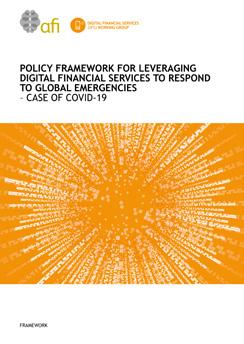
3 minute read
EXECUTIVE SUMMARY
This special report explores how AFI members have managed to protect and promote women’s financial inclusion and effectively apply it as part of a crisis response toolbox against the backdrop of the global COVID-19 pandemic.
Unless urgently addressed, the setbacks experienced by girls and women due to the pandemic are bound to accumulate and form a drag on growth instead of elevating the multi-trillion-dollar opportunities for women’s economic inclusion in developing countries. A case of socioeconomic “long COVID” may affect human capital development and entrench gender and social inequalities for the foreseeable future.
Advertisement
Encouraging evidence is mounting – including in large countries like Bangladesh, Egypt, Nigeria, and Pakistan - that gender-intentional policies can invert even previously widening gaps. The contributions of women delivering faster and more sustainable growth that Gender Inclusive Finance (GIF) can help unlock have increasingly been understood in recent years. The pandemic has now added tangible evidence that a gender lens to policy translates into a more effective crisis response, which is of relevance to resourceconstrained policymakers in emerging markets. GIF also emerges clearly as a policy priority for building crisis resilience into the economy, financial system, and climate change agenda.
Women constitute a prime target for livelihood support and sustaining aggregate demand because they are key pillars of the informal economy, often responsible for everyday household finances, yet disproportionately vulnerable to income shocks and tied to some of the other most vulnerable groups via their care responsibilities.
Often, though, this growing recognition has yet to translate into action: GIF knowledge products deserve wider reach (a survey of 30 AFI members implies less than one-third familiarity and one-sixth active usage), National Financial Inclusion Strategies (NFIS) predominantly remain gender-neutral, or group women under vulnerable populations while very limited indepth research has been undertaken to understand which specific policies are effective for GIF in crisis situations.
Effective, sex and age-disaggregated data became evident as a weak point in the greater application of GIF during the crisis. A nearly universal notion of its importance and the improved possibility of collection and analysis contrasts with the lack or low frequency of collection of sex-disaggregated data on the supply-side, gaps in coverage of providers, limited use of costeffective demand-side data, and gender intentional analysis to inform policy. A set of pioneering regulators demonstrate, though, how sex-disaggregated data collection and analysis efforts do enable evidencebased policymaking and boost efficiency in a rapidly evolving, complex crisis.
In crises that disrupt economic and social interactions, policy responses require new alliances and intensified coordination both within the public sector and with a broader set of providers. Combining fiscal, monetary, and regulatory crisis response became a widespread reality during the pandemic. The most innovative and impactful interventions, though, emerged from coordination routines often enabled by previous NFIS implementation, and they leveraged specialist expertise from stakeholders who have women on their agenda.
Digital Financial Services (DFS) has proven to have a central role in advancing (women’s) financial inclusion while delivering a crisis response.
The nexus of DFS and women featured prominently, especially in social relief policies: in the scale-up of conditional cash transfers, new programs for vulnerable groups, and support for informal income earners. The latter stood out for innovations in multiple developing countries, achieving large-scale gains in financial inclusion and mitigating pandemic disruptions in ways previously unfeasible.
Swift reactions in the DFS space during the crisis built on an enabling environment which policymakers launched ahead of such a crisis, and for which a genderintentional approach produced superior outcomes. Key items include a market accessible to various types of providers, investment in agent networks and merchant acceptance, and consumer protection. Applied jointly with initiatives to broaden the use of formal financial services, especially for women, these are key measures to build resilience to future crises.
AFI’s DFS working group published a Policy Framework for Leveraging Digital Financial Services to Respond to Global Emergencies – Case of COVID-19,1 which provides policy guidance to regulators within the AFI network and beyond, in developing relevant policy and regulatory responses to mitigate the effects of global pandemics by leveraging DFS. Although this guidance is immediately relevant to the COVID-19 outbreak, it is also applicable for other emergencies, including natural and man-made disasters such as cyclones, earthquakes, conflicts, forced displacements, etc.
Financial sector stability and women’s financial inclusion have proven mutually reinforcing rather than trade-offs when policy resources for crisis response are contested. The renewed spirit of the Denarau Action Plan (DAP),2 which was recently updated by AFI members at the 2022 Global Policy Forum is very timely. Embedding a gender lens in financial sector development and inclusion policies is an indispensable priority to deal with more frequent socioeconomic disruptions that go beyond central bank and regulator textbooks.
Policy framework for leveraging digital financial services to respond to global emergencies – case of COVID-19

> View here
Denarau Action Plan
> View here
1 Available at: https://www.afi-global.org/publications/policyframework-for-leveraging-digital-financial-services-to-respond-to-globalemergencies-case-of-covid-19/
2 Available at: https://www.afi-global.org/wp-content/uploads/2022/09/ Denarau_Accord-22_stg3.pdf


